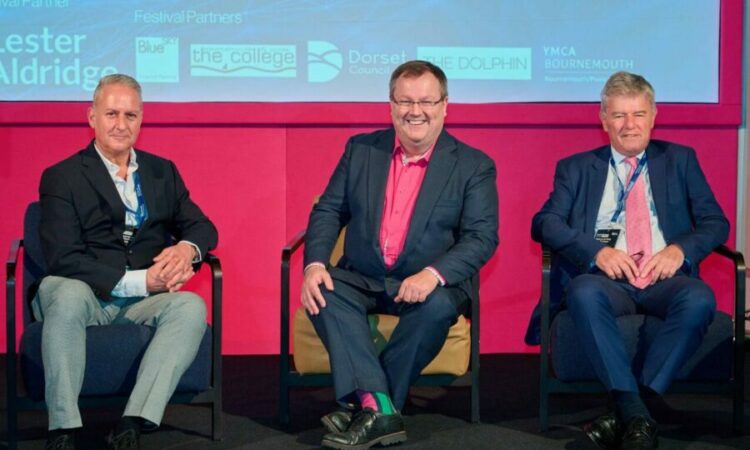
From left – Ian Girling, Chief Executive of Dorset Chamber; Declan Curry, Business Journalist Broadcaster; and David Smith, Economics Editor at The Sunday Times.
Businesses in Dorset need to prepare now for the workplace of the future, the first conference of its kind in the county heard.
 More than 150 people attended the inaugural Dorset Business Festival Conference, held by Dorset Chamber at the Hilton Bournemouth.
More than 150 people attended the inaugural Dorset Business Festival Conference, held by Dorset Chamber at the Hilton Bournemouth.
On stage, five panels of experts discussed a range of topics relevant to growth as the UK emerges from 15 years of economic shocks hindering productivity.
Hosted by business journalist broadcaster Declan Curry, and open to the whole business community, the event was part of the four-day festival culminating in the gala dinner awards evening at the hotel.
Discussions focused on the workplace of the future, ESG for business growth, town centre regeneration, AI and technology for the future, and skills for future growth.

Ian Girling
Ian Girling, Chief Executive of Dorset Chamber, said: “This is the first conference of its kind that the Chamber, which celebrates its 75th anniversary next year and has 650 members driving the local economy, has put on.
“We touched upon some really important issues today – we know we must develop our workplaces as we look to the future.
“That includes reducing our carbon footprints, knowing how to incorporate AI responsibly and productively into work tasks and that local employers must do all they can to engage regularly with schools and colleges.
“Feedback on the conference has been superb, with inspired delegates jotting down notes to take back to their own businesses as discussion and action points.
“It was apparent that businesses need to prepare now for the workplace of the future.

Declan Curry
“However, many are already on the case thankfully – and the conference will have initiated boardroom conversations which will power positive change so that businesses are as ready as they can be for tomorrow’s working world.”
Law firm Lester Alridge was Premier Festival Partner and Festival Partners were Blue Sky Financial Planning, Bournemouth and Poole College, Dorset Council, The Dolphin in Poole and YMCA Bournemouth.
Setting the wider context for businesses was keynote speaker David Smith, Economics Editor at The Sunday Times since 1989.
He illustrated how the UK has been battered by repeated shocks since the global financial crash in 2008–9.
These included Brexit, the pandemic, the Russian invasion of Ukraine (resulting in record energy price rises), the cost-of-living crisis driven by stubbornly high inflation, £2.6 trillion of public debt, the highest tax burden since the Second World War and the highest Bank of England base interest rate in 15 years.

David Smith
David also pointed out that Liz Truss and Kwasi Kwarteng were the first Prime Minister and Chancellor to be brought down by the financial markets following the disastrous mini budget in September 2022.
As a consequence of these shocks, UK productivity – which determines whether we are prosperous and competitive or not – has been “dire”; in the 15 years since 2008, GDP per head rose by just 6 per cent compared to 42 per cent in the previous 15 years.
This means that the UK has a growth and productivity problem; consensus forecasts are for 0.3 per cent growth this year and similar next year, that a recession will be probably avoided but there won’t be much growth either.
What does this mean for Dorset, which has 52,000 businesses, with 90 per cent employing 10 or less people?
David said: “Worker shortages should be starting to ease, as should cost pressures. But plenty of longer-term challenges remain, including transport infrastructure, skills, etc, and the levelling up agenda is not what it was.”






